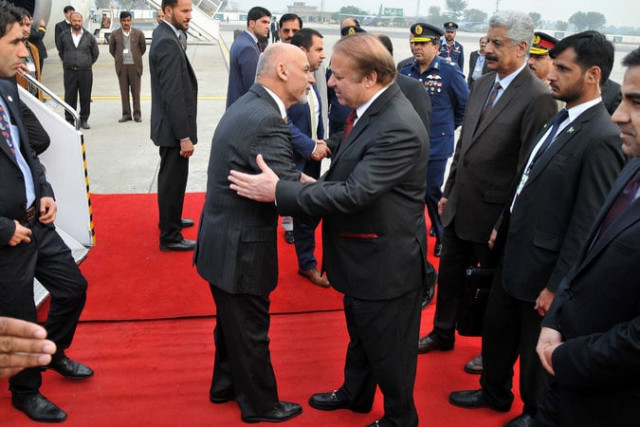Afghan president receives unexpected welcome in Pakistan
As Ghani stepped off his plane he was surprised to discover the greeting party far exceeded the demands of protocol

Prime Minister Nawaz Sharif of Pakistan, right, greeted President Ashraf Ghani of Afghanistan, left, in Rawalpindi, Pakistan, on Wednesday. PHOTO: AFP
As the Afghan president stepped off his plane at the Islamabad airport he was surprised to discover that the greeting party far exceeded the demands of protocol, with the Pakistani prime minister and all of the country’s military chiefs on the red carpet along with many other dignitaries, as an honour guard blasted off a 21-gun salute.
Army chief assures Ashraf Ghani support for peace in Afghanistan
It was the sort of welcome normally reserved for visits from prominent Pakistani allies like the president of China or the king of Saudi Arabia — not the leader of the country next door that has been in a war of words, and from time to time guns, with Pakistan for years now, with a turn for the worse in recent months.
Mr Ghani had been under intense domestic pressure to not even come, even though he was the co-host, with Pakistan, of an event about Afghanistan called the Heart of Asia conference, attended by every other country in south and Central Asia. The welcome was a clear measure that Pakistan wants to mend the frayed relationship.
As many Afghans watched on television, Mr Ghani did smile a bit at the airport, and he profusely thanked the Pakistani prime minister for the warm welcome. But in a speech to his hosts later, he again grimly criticized Pakistan for doing too little to deprive the Taliban of safe havens here.
Afghans, Pakistan hold firm on ties; India 'extends hand' to Pakistan
“We are fighting on behalf of all of you, but we are the ones who are suffering some of the worst atrocities,” Mr Ghani said.
Mr Ghani suffered major political damage when he announced plans early this year to repair relations with the Pakistanis, in an effort to start peace talks that the Pakistanis said they were willing to facilitate. Then last summer, the Afghans discovered that the Pakistanis had been arranging for them to, in effect, negotiate with a dead man, as news leaked out that the Taliban leader Mullah Muhammed Omar had been dead for at least two years.
Many felt the leak about Mullah Omar’s death was a deliberate play by the country’s National Directorate of Security which, like Mr Saleh, has long opposed better relations with Pakistan before the Pakistanis change their policies toward Afghanistan. Scuttling the talks led Mr. Ghani to reject his earlier efforts to reconcile with Pakistan.
Only in recent weeks have there been some early, tentative steps to restart peace talks with the Taliban, a process that Afghanistan’s Western allies say requires Pakistan’s support.
Pakistan wants durable peace in Afghanistan, says Aziz
But Mr Ghani’s government had demanded a series of guarantees from Pakistan before resuming warmer relations, none of which it had received. Hence the pressure on him not to attend Wednesday’s one-day conference, which was billed as an attempt to promote economic and security cooperation among Afghanistan and its neighbors. The exact demands are not known, but are believed to include guarantees to remove Taliban safe havens in Pakistan, improve treatment of Afghan refugees, and end the treatment of Taliban wounded in Pakistani hospitals.
The United States government also pressed hard for Mr Ghani not to boycott the meeting.
Pakistani officials also had demands of their own, including that Afghanistan stop allowing Pakistani Taliban fighters to use sanctuaries on its side of the border, and to stop officials’ frequent condemnation of Pakistan.
The daylong meeting included sideline negotiations with the Americans and Chinese, as well as a meeting between the Indian and Pakistani foreign ministers.
Afghan insurgents urged to reengage with Kabul
Afterward, a joint statement from Afghanistan, Pakistan and the United States called for immediate efforts to restart peace talks between the Afghan government and the Taliban. The time between now and April, when fighting usually intensifies with warming weather, was discussed as the best window of opportunity to make progress.
At a news conference, the Afghan foreign minister, Salahuddin Rabbani, held out hope for the efforts on peace talks. “We very much hope that this effort will result in a result-oriented peace process where we see some policy moves in the coming weeks,” Mr Rabbani said.
This article originally appeared on The New York Times, a partner of The Express Tribune.



















COMMENTS
Comments are moderated and generally will be posted if they are on-topic and not abusive.
For more information, please see our Comments FAQ